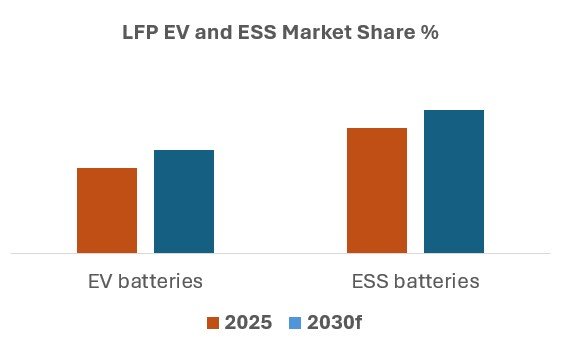Lithium Iron Phosphate (LFP) batteries are a fast-growing chemistry, forecast to expand at 21% annually through 2035 (Source: Future Market Insights). Originally pioneered in China, LFP delivers a compelling performance with low cost, long cycle life, and thermal stability, making it an attractive alternative to nickel- and cobalt-rich NMC/NCA chemistries.
As LFP technology has matured, its performance gap with NMC has narrowed, leading to global adoption. Tesla shifted its standard-range models to LFP, European OEMs are now designing LFP-based platforms, and the U.S. Inflation Reduction Act is catalysing new domestic LFP investments. The result is a structural shift in battery chemistries: LFP’s share of global EV and Energy Storage System (ESS) battery demand is growing, and may continue to do so:

Yet the very advantage that makes LFP attractive to automakers creates a structural problem for recyclers. LFP contains no nickel or cobalt, the main revenue drivers for today’s recycling businesses. Instead, it yields far lower-value black mass, dominated by iron and phosphate, while still requiring the same processing effort to recover lithium. Achieving battery-grade lithium from LFP streams is challenging due to iron and other contaminants and more complex refining steps.
As a result, LFP black mass is worth only a fraction of NMC black mass, and the economics of traditional black-mass recycling become unsustainable when LFP volumes rise. The historical recycling revenue model built on Ni/Co recovery simply does not work for LFP-dominated waste streams.
The solution will be to rethink the recycling model around black mass. Some recyclers are already pivoting to lithium- and phosphate-centric and recovery processes, optimised specifically for LFP. Some innovators are developing direct regeneration of LFP cathodes rather than full chemical refining, a route that preserves material value and reduces processing cost. In short, the winners in an LFP-heavy future might be those who redesign their economics around lithium.
MM Markets (mm-markets.com) are specialists in the field of metals and materials markets, we closely track emerging issues such as regulations, recycling development and materials substitution.



